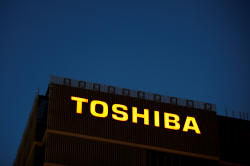Analysis-Banks profit from building up and breaking up companies
 Send a link to a friend
Send a link to a friend
 [November 16, 2021] By
Anirban Sen and David French [November 16, 2021] By
Anirban Sen and David French
(Reuters) - It is a constant dilemma facing
companies; do they acquire or shed businesses to boost shareholder
returns? Investment bankers profit every time the answer involves a
deal, even if it represents an about-face for the companies.
Last week's announcements by General Electric Co, Toshiba Corp and
Johnson & Johnson of their plans to break up offer the latest examples
of how some companies have spent hundreds of millions of dollars on
investment banking fees to bulk up through acquisitions over the years,
only to pay more fees to reverse them.
Some of the banks that worked on preparing these spin-offs - Goldman
Sachs Group Inc, JPMorgan Chase & Co and UBS Group AG - advised on
previous acquisitions that took the companies in an opposite strategic
direction.
Goldman Sachs, JPMorgan and UBS did not respond to requests for comment.
Corporate break-ups are on the rise amid a growing consensus on Wall
Street that companies perform best only if they are focused on adjacent
business areas, as well as increasing pressure from activist hedge funds
pushing them in that direction.
Some 42 spin-offs collectively worth over $200 billion have been
announced globally so far this year, up from 38 spin-offs worth roughly
$90 billion in 2020, according to Dealogic.

Investment banks have collected more than $4.5 billion since 2011
advising on spin-off deals globally, according to Dealogic. While this
represents less than 2% of what they pocketed from deal fees overall, it
is a growing franchise; banks have so far earned over $1 billion on
spin-offs globally so far this year, nearly twice what they earned in
2020, according to Refinitiv.
For an interactive graphic, click on this link: https://tmsnrt.rs/3cgKJ9M
In the case of GE, financial advisors including Evercore Inc, PJT
Partners Inc, Bank of America Corp and Goldman Sachs each stand to
collect tens of millions of dollars from their advisory roles on the
company's break-up, according to estimates from M&A lawyers and bankers.
Goldman Sachs had previously collected nearly $400 million in fees
advising the company on acquisitions, divestitures and spin-offs over
the years, making it GE's top advisor based on fees collected, according
to Refinitiv.
[to top of second column] |

The logo of Toshiba Corp. is seen at the company's facility in
Kawasaki, Japan June 10, 2021. REUTERS/Kim Kyung-Hoon

Industrywide, Goldman Sachs has earned the most in fees from advising on
corporate break-ups thus far in 2021, followed by JPMorgan and Lazard Ltd,
according to Dealogic.
Yet while investment banking fees are secure, the outcome of dealmaking for a
company's shareholders is far from certain. Shares of companies that engaged in
acquisitions or divestments have had a mixed track record, often underperforming
peers in the last two years, according to Refinitiv.
INDEPENDENT ADVICE
To be sure, investment bankers argue that some combinations do not make sense
for ever. Changes in a company's technological and competitive landscape or in
the attitude of its shareholders can push it to change course.
For example, GE shareholders were initially supportive of its empire-building
acquisitions in businesses as diverse as healthcare, credit cards and
entertainment, viewing them as diversifying its earnings stream. When some of
these businesses started to underperform and GE's valuation suffered, investors
lost faith in the company's ability to run disparate businesses.
Bankers often also argue that most companies want to pay bankers for delivering
deals rather than advice on whether they need to do a deal in the first place.
This creates incentives for bankers to try to clinch a transaction rather then
the best outcome for their client that may not involve a deal.
It also offers ammunition to Wall Street critics who argue that companies cannot
rely on banks for independent advice on whether they should pursue a deal.
"Companies should develop valuations in-house and with help from unbiased
third-party advisers, whether or not they also hire an investment bank," said
Nuno Fernandes, professor of finance at IESE Business School.
(Reporting by Anirban Sen in Bengaluru and David French in New York; Editing by
Greg Roumeliotis and Stephen Coates)
[© 2021 Thomson Reuters. All rights
reserved.] Copyright 2021 Reuters. All rights reserved. This material may not be published,
broadcast, rewritten or redistributed.
Thompson Reuters is solely responsible for this content.
 |